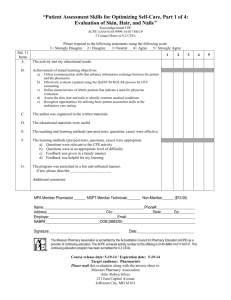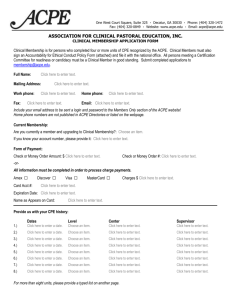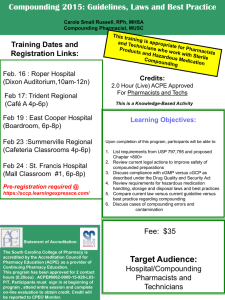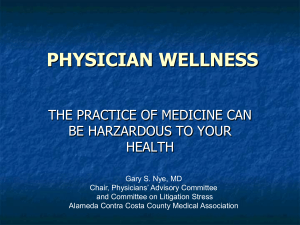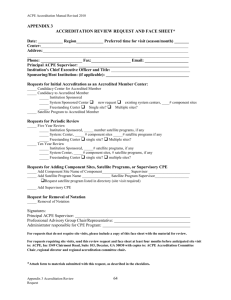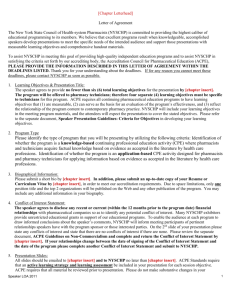Three Essential Management Tasks
advertisement
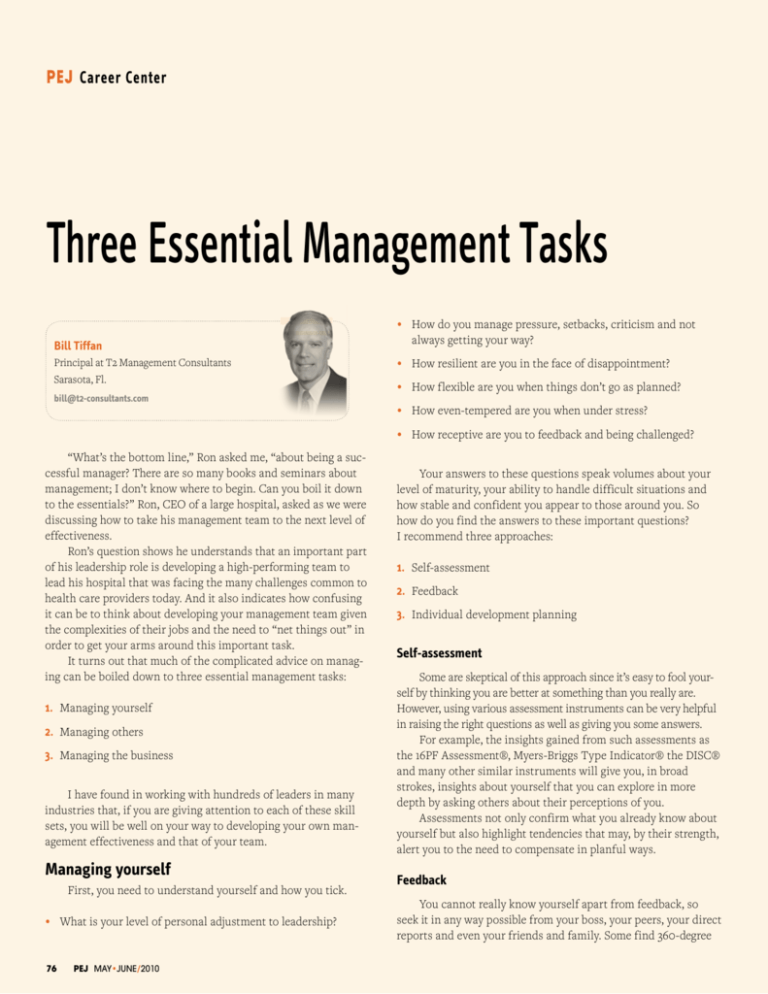
PEJ Career Center
Three Essential Management Tasks
Bill Tiffan
Principal at T2 Management Consultants
Sarasota, Fl.
bill@t2-consultants.com
• How do you manage pressure, setbacks, criticism and not
always getting your way?
• How resilient are you in the face of disappointment?
• How flexible are you when things don’t go as planned?
• How even-tempered are you when under stress?
• How receptive are you to feedback and being challenged?
“What’s the bottom line,” Ron asked me, “about being a successful manager? There are so many books and seminars about
management; I don’t know where to begin. Can you boil it down
to the essentials?” Ron, CEO of a large hospital, asked as we were
discussing how to take his management team to the next level of
effectiveness.
Ron’s question shows he understands that an important part
of his leadership role is developing a high-performing team to
lead his hospital that was facing the many challenges common to
health care providers today. And it also indicates how confusing
it can be to think about developing your management team given
the complexities of their jobs and the need to “net things out” in
order to get your arms around this important task.
It turns out that much of the complicated advice on managing can be boiled down to three essential management tasks:
1. Managing yourself
2. Managing others
3. Managing the business
I have found in working with hundreds of leaders in many
industries that, if you are giving attention to each of these skill
sets, you will be well on your way to developing your own management effectiveness and that of your team.
Managing yourself
First, you need to understand yourself and how you tick.
• What is your level of personal adjustment to leadership?
76
PEJ may•june/2010
Your answers to these questions speak volumes about your
level of maturity, your ability to handle difficult situations and
how stable and confident you appear to those around you. So
how do you find the answers to these important questions?
I recommend three approaches:
1. Self-assessment
2. Feedback
3. Individual development planning
Self-assessment
Some are skeptical of this approach since it’s easy to fool yourself by thinking you are better at something than you really are.
However, using various assessment instruments can be very helpful
in raising the right questions as well as giving you some answers.
For example, the insights gained from such assessments as
the 16PF Assessment®, Myers-Briggs Type Indicator® the DISC®
and many other similar instruments will give you, in broad
strokes, insights about yourself that you can explore in more
depth by asking others about their perceptions of you.
Assessments not only confirm what you already know about
yourself but also highlight tendencies that may, by their strength,
alert you to the need to compensate in planful ways.
Feedback
You cannot really know yourself apart from feedback, so
seek it in any way possible from your boss, your peers, your direct
reports and even your friends and family. Some find 360-degree
feedback processes very helpful as they provide input from the various business stakeholders who know you well. They provide
perspective on your skills and knowledge
that, together with your self-assessment, are
very practical and useful feedback.
But everyday feedback can also be
useful. For example, “Bill, you did a great
job with that presentation because______.
I suggest you also consider adding something about _____ next time which would
strengthen your argument and be more
relevant to other audiences.”
Such feedback causes you to reflect on
what you have done and make adjustments
much like real time feedback through navigation instruments and flight controllers
help pilots to make adjustments to their
flight plans for a smoother flight.
How well you relate to others is critical to your
success as a manager. What is your level of
interpersonal savvy? How well do you relate to
and interact with others? How strong are the
teams you build? How competent are the people
you select and promote?
Individual development planning
This takes all the data from assessments and feedback and allows you to put
them into a structured plan. Such plans
normally focus on just two or three goals
(e.g. to be a more incisive decision maker,
to delegate more effectively to develop others), specific action steps to move toward
those goals and how to measure progress.
Individual development planning can
be used to make adjustments to your career
“flight plan,” if you will, to help you navigate
more smoothly through your career.
Advertisement
Managing others
How well you relate to others is
critical to your success as a manager.
• What is your level of interpersonal
savvy?
• How well do you relate to and interact
with others?
Career Center
• How strong are the teams you build?
• How competent are the people you
select and promote?
• How solid are your relationships with
peers, bosses, customers and direct
reports?
How you answer these questions is a
good indicator of whether you have developed willing followers or people who
follow you only because you’re the boss.
ACPE.org
77
PEJ Career Center
A great place to start in managing your
business relationships is by completing
and managing according to a stakeholder
matrix, a tool to help you assess and better
leverage your business relationships. This
matrix is made by creating a spreadsheet on
which you list all the key stakeholders you
interact with in business: your boss, direct
reports, peers, other senior leaders and others. Then create columns to evaluate your
business relationships.
For example: Strength of my relationship with this person? Importance of this
person to my success? How committed is
this person to my success? Rate each one
with a number and you will quickly figure
out where you might need to spend more
time to build stronger business relationships. Finally add notes about strategies to
use to better leverage each relationship for
greater business success.
Another important strategy involves
managing and developing your team, both
in terms of their individual development
and how they interact with each other to
manage the business.
For details on placing classified
ads, consult our rate card in the
online media kit at ACPE.org
or call 800/562-8088
Dalton Boggs and Associates
Aprofessionalconsultingfirmassistingclient
organizationsintheexecutivesearchprocess.
Specializinginphysicianmanagementpositions.
Resumeorvitaemaybeforwardedtoouroffice:
P.O. Box 2288, Edmond, Oklahoma 73083
Telephone: (800) 348-1654
Telefax: (405) 348-1693
Email: daltonb@boggsassociates.net
78
PEJ may•june/2010
Often I find that leaders are not
hands-on enough to effectively guide their
teams. They have thoughts like “I hired
strong performers who don’t need me to
micro-manage them. I’ll be there for them
if they need me.” This amounts to abdicating your management responsibility.
The role of a manager can be viewed
in four dimensions as shown in Figure 1.
Many managers think of their roles as
two-fold: set expectations for performance
and monitor and measure performance.
They think that doing those two things
add up to holding people accountable.
But as the diagram suggests, there are
two other responsibilities that balance out
the model. Whenever you set expectations,
you must balance them by supporting the
person with the necessary coaching, training
and resources to meet those expectations.
And not only should you monitor and
measure performance, but you must also
balance these actions by acknowledging that performance with feedback and
appropriate recognition and consequences
for how the job was done.
Managing the business
It is essential, of course, that you
know your business.
• What is your level of business acumen?
• How do you approach decision-making?
• How skilled are you at reasoning, analysis and creative problem solving?
• How well versed are you in accounting,
finance, operations, customer service,
sales, marketing and human resources?
• How effective are you at strategic
planning, trouble-shooting and
anticipating trends?
• How well do you know your product,
service, industry and market conditions?
• How well do you know your competition and your potential for expansion
and diversification?
Manager's Role
Set Expectations
For Performance
{
Business Performance
Teamwork
Communication Frequency
and Style
Ranked Priorities
Follow Up: Inspect What You Expect
Ensure Alignment With Expectations
{
Seek Feedback From Other Sources
Acknowledge
Performance
{
Monitor &
Measure Performance
Provide Feedback
Recognize & Reward
Training
Coaching
Tools & Resources
{
Set and Manage Consequences
Support Performance
GUMBERT
& ASSOCIATES
Physician Executive Search
Send or fax resume/cv to
P.O. Box 483
Surfside, CA 90743
e-mail: gumbert@gte.net
FAX 562-592-2288
or call Gary Gumbert
562-592-1818
ACPE.org
79
Career Center
Specializing
in Physician Executive
placement nation-wide
Your answers to these questions say a
lot about your business knowledge and the
types of people you need on your team to
help compensate for any knowledge and
skill gaps.
Here is where your technical expertise
comes into play. In today’s complex world
that is constantly changing, you must learn
to manage the business at many levels and
in the context of many types of problems.
This is why the first two competency
areas are so important: by managing yourself, you will know your limitations and
be able to find ways to fill skill and knowledge gaps. By managing others, you will be
able, through collaboration and teamwork,
to build the kinds of team relationships to
manage a diverse set of business challenges you will face. Today’s business world
is simply too complex and fast moving to
manage alone.
That said, you do need to continue to
build your skills in the areas referenced in
the above questions about your abilities as
a business person. I find this is often the
Achilles heel of many leaders in health care.
As a health care leader, you did not
enter this profession through the doorway
marked “leadership” or “management.”
You entered through the door of clinician,
researcher, academician or technician. You
joined this profession because of your passion for health care, for serving patients
and for furthering the scientific developments that will produce the drugs, the
medical devices and clinical procedures
needed to serve future generations.
Executive coaching, team building
initiatives, leadership training classes and
self-assessment tools are all additional
resources you can draw on to develop your
management skills in the above areas. If
you are already skilled in any or all of these
areas, make sure that you are passing that
knowledge on to others.
Growing the business, the people and
yourself are some of the surest ways to
achieve success regardless of where you
are in the organization, what position you
hold and where you are in your career.
Advertising Index
Leadership Development Program . . . . . . . . . . . . . . . . . . . . . . . C-1, 1
ACPE Publications . . . . . . . . . . . . . . . . . . . . . . . . . . . . . . . . . . . . . . . . 33
acpe.org/leadership
acpe.org/publications
ACPE Distance Education Courses . . . . . . . . . . . . . . . . . . . . . . . . . . . 07
USC MMM Program . . . . . . . . . . . . . . . . . . . . . . . . . . . . . . . . . . . . . . . 43
acpe.org/interact
marshall.usc.edu/mmm
ACPE Membership . . . . . . . . . . . . . . . . . . . . . . . . . . . . . . . . . . . . . . . . . 08
ACPE Membership Directory . . . . . . . . . . . . . . . . . . . . . . . . . . . . . . . . 45
acpe.org
acpe.org/myacpe
ACPE Publications . . . . . . . . . . . . . . . . . . . . . . . . . . . . . . . . . . . . . . . . 09
ACPE Publications . . . . . . . . . . . . . . . . . . . . . . . . . . . . . . . . . . . . . . . . 49
acpe.org/publications
acpe.org/publications
Cogent Healthcare . . . . . . . . . . . . . . . . . . . . . . . . . . . . . . . . . . . . . . . . . 13
UMASS MBA Degree . . . . . . . . . . . . . . . . . . . . . . . . . . . . . . . . . . . . . . . 57
cogenthealthcare.com
umass.edu/mba/acpe
ACPE Degree Program . . . . . . . . . . . . . . . . . . . . . . . . . . . . . . . . . . . . 15
ACPE Partnership . . . . . . . . . . . . . . . . . . . . . . . . . . . . . . . . . . . . . . . . 62
acpe.org/degrees
acpe.org/partners
ACPE Distance Education Courses . . . . . . . . . . . . . . . . . . . . . . . . . . . 19
Carnegie Mellon MMM Degree . . . . . . . . . . . . . . . . . . . . . . . . . . . . . . 64
acpe.org/interact
heinz.cmu.edu/mmm
ACPE Fellowship . . . . . . . . . . . . . . . . . . . . . . . . . . . . . . . . . . . . . . . . . . 21
ACPE CareerLink . . . . . . . . . . . . . . . . . . . . . . . . . . . . . . . . . . . . . . . . . . 69
acpe.org/fellowship
acpe.org/career
CPE . . . . . . . . . . . . . . . . . . . . . . . . . . . . . . . . . . . . . . . . . . . . . . . . . . . . 27
ACPE Course List . . . . . . . . . . . . . . . . . . . . . . . . . . . . . . . . . . . . . . . . . c-3
ccmm.org
acpe.org/education
ACPE Onsite Education . . . . . . . . . . . . . . . . . . . . . . . . . . . . . . . . . . . . . 29
ACPE PIM . . . . . . . . . . . . . . . . . . . . . . . . . . . . . . . . . . . . . . . . . . . . . . . . c4
acpe.org/onsite
acpe.org/pim
ACPE Publications . . . . . . . . . . . . . . . . . . . . . . . . . . . . . . . . . . . . . . . . 32
acpe.org/publications
Stay at the top of your game!
Non-Members of ACPE can subscribe to the The Physician Executive Journal
and keep up with all the latest information in medical management.
Just $80.00
To Order: Visit our Website at ACPE.org or call 800/562-8088
80
PEJ maY•June/2010
Career Center
Subscription
